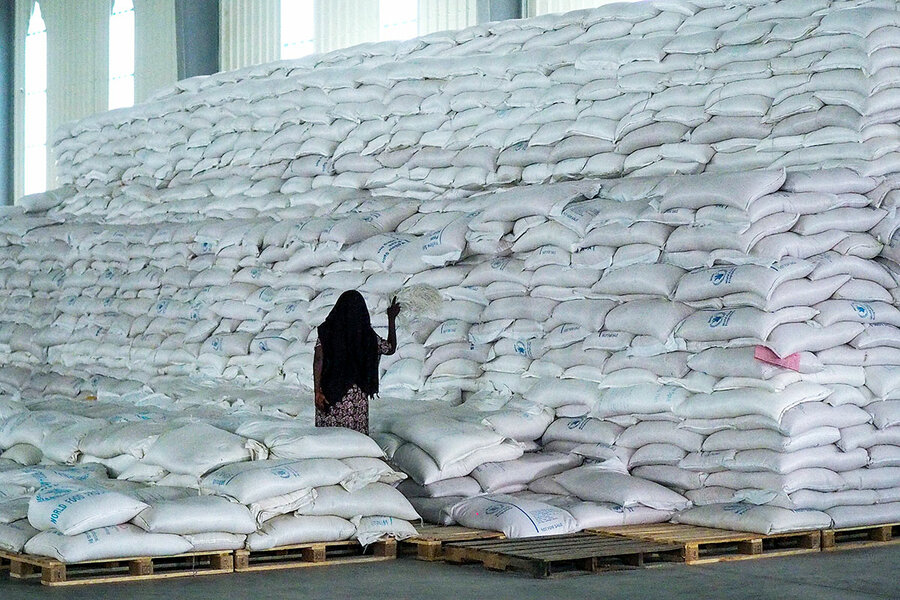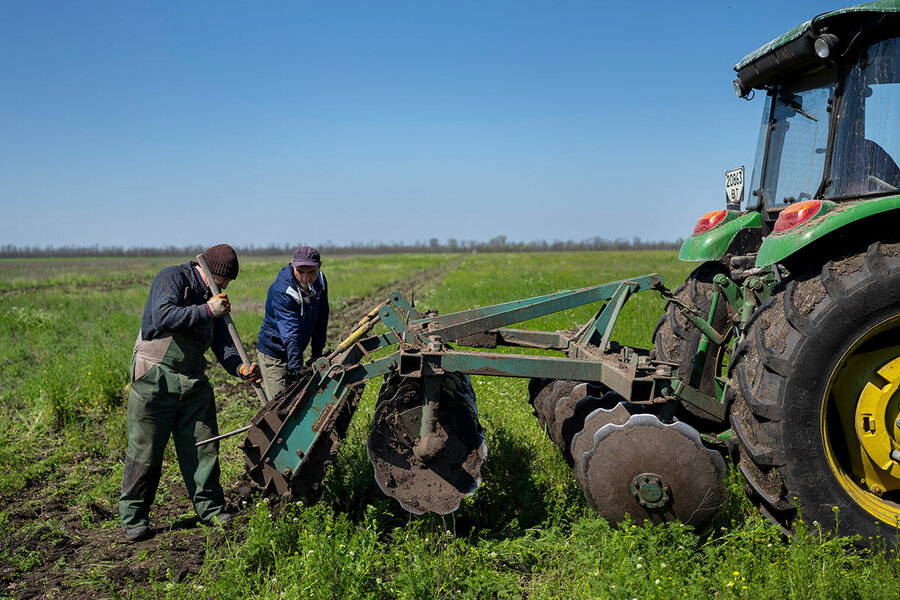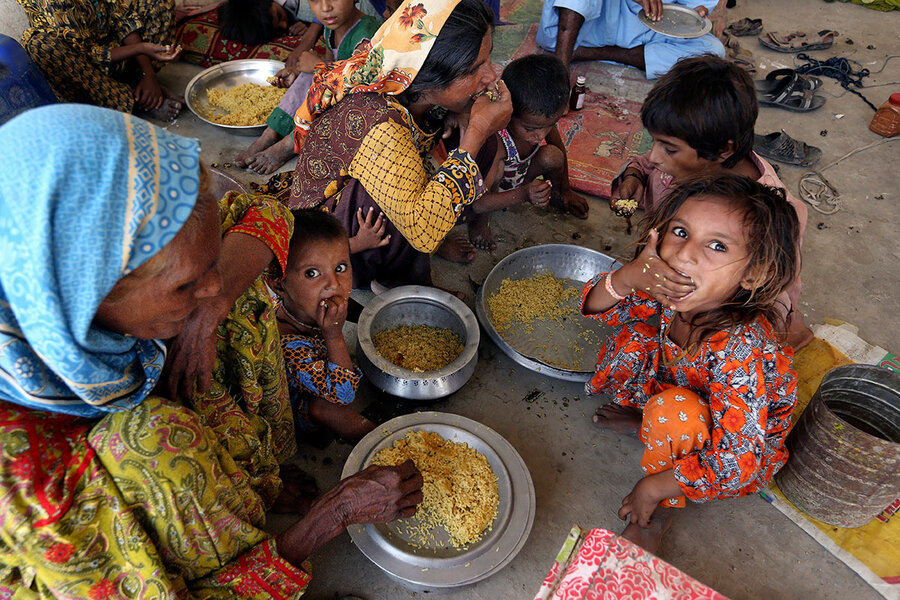
The lines of refugees fleeing Sudan for food and safety illustrate how the war is adding to the rising numbers of acutely hungry people around the world. Indeed, wars and protracted conflicts – from Yemen and Syria to Afghanistan – were already a major factor in the global food security crisis.
Today 345 million people face acute food insecurity, according to the United Nations World Food Program – more than double the number in 2019. The international community is battling to cope with new conflicts, weather disasters, and signs of donor fatigue among major aid contributors.
Why We Wrote This
A story focused on
Donors have responded generously to boost global resilience to food shortages, but today’s numbers are daunting: more hungry people in more countries. The war in Sudan is just the latest surprise.
“What we are facing is really a wildfire of spreading food insecurity,” says Martin Frick, director of the WFP’s Berlin office.
Catherine Maldonado, senior director for food security with Mercy Corps, says she’s concerned that the world’s understandable focus on crises such as Sudan “means we aren’t talking enough about what we could be doing now to prevent the places that are already in a tight spot from reaching the tipping point.”
“We can’t afford to lose sight of these efforts that are helping communities on the brink,” she says, “so that we don’t see in the coming years the kind of increase in people crossing that tipping point to acute hunger that we’ve seen this year.”
In the weeks since fighting erupted in Sudan, ever larger groups of women and children have been fleeing across the border into Chad, seeking food and safety.
Chadians and international relief organizations already on-site to address Chad’s own food shortfalls have been doing what they can to feed and shelter the refugees – even if that means only a watery bowl of porridge and a bedsheet tied to tree branches.
And as the war rages on, the scene in Chad is being repeated in many of Sudan’s other neighbors, as refugees pour into Horn of Africa nations already facing rising hunger as a result of conflict, drought, and economic turmoil.
Why We Wrote This
A story focused on
Donors have responded generously to boost global resilience to food shortages, but today’s numbers are daunting: more hungry people in more countries. The war in Sudan is just the latest surprise.
The lengthening lines of refugees illustrate how Sudan’s war – a surprise to most of the world when the armed forces and a powerful paramilitary organization began fighting in the capital Khartoum a month ago – is adding to the rising numbers of acutely hungry people around the world.
“What we are facing is really a wildfire of spreading food insecurity,” says Martin Frick, director of the United Nations World Food Program (WFP) Berlin office.
Wars and protracted conflicts – from Yemen and Syria to Afghanistan – were already contributing heavily to the world’s food security crisis. Now this war, in a global hunger hot spot, is exacerbating a crisis that even before this year had wiped out previous steady progress in reducing acute hunger.
For one thing, the Sudan war has erupted at a time when global food prices are particularly high, sent skyward by the war in Ukraine – one of the world’s critical breadbaskets – and by lingering pandemic supply chain disruptions.
Hunger’s four C’s
That has added a new “C” – cost – to what food experts previously called the “3 C’s” of the food insecurity crisis: conflict, COVID-19, and climate change.
With 345 million people facing acute food insecurity, according to the WFP – more than double the 135 million in the same straits in 2019 – the international community is battling to cope with new conflicts, multiplying weather disasters, and signs that major donors will not be contributing as much as usual.
The U.N. organization says the 345 million are now in 79 countries – “many, many more [countries] than in 2019,” Mr. Frick adds.
Increasingly intense and destructive weather is one factor, he says – last year’s epochal flooding in Pakistan and extended drought in Africa are just two examples.
But with armed conflict considered the biggest single driver of food insecurity, Mr. Frick notes that the number of “live wars” is double what it was a decade ago.
“The number of protracted wars … is not going down, and then we have the new wars in Ukraine and now Sudan that add to the already high numbers” of people facing food insecurity, he says.
Shaky grain deal
Russia’s war in Ukraine has been particularly damaging, Mr. Frick adds, since before the invasion more than 400 million people – many in countries with vulnerable populations – depended on Ukraine’s grain.
Last year the U.N. and Turkey brokered a deal with Ukraine and Russia to provide safe passage for shipments of Ukrainian grain from Black Sea ports. The deal has been a success, U.N. and other experts say, allowing Ukraine to safely export about 30 million metric tons of grains and other foods.
Indeed, the WFP has been one of the major beneficiaries of the deal, with the organization procuring about 600,000 metric tons of grains for its operations in a number of countries, including Afghanistan, Ethiopia, and Somalia.
But now the agreement appears to be on shaky ground; Turkish president Recep Tayyip Erdogan announced Wednesday that the deal had been extended for two months, but its future remains uncertain: Russia is threatening to pull out if it doesn’t reap more benefits for its own food and fertilizer producers.
“Russia must stop holding global food security hostage to its cynical power plays and profit-taking,” Robert Wood, the deputy U.S. ambassador to the U.N., said before a Security Council session that discussed the grain deal on Monday.
Russia counters that the grain deal as implemented is helping wealthy Western countries bring down food prices more than it is benefitting the world’s hungry.
Domestic pressures
Signs that “donor fatigue” could be setting in among some traditional food aid providers are also spurring concerns. Falling or internally redirected humanitarian budgets in some countries suggest that domestic pressures to focus on post-pandemic recovery at home may be undermining enthusiasm about addressing the global crisis.
When a series of food price shocks struck developing countries in 2007-08, “we saw an impressive number of countries in the international community come together to address that,” says Catherine Maldonado, senior director for food security with Mercy Corps.
“But now food prices are up around the globe,” she adds, “and that has made it hard for some to join in a global response when some of these same issues they would be addressing with humanitarian funding are being felt at home.”
Against that backdrop, the G-7 group of developed nations is set to take up the food security issue when leaders meet in Hiroshima, Japan, this weekend.
Mr. Frick of the WFP says Western countries have responded the most generously to the burgeoning food assistance needs, with the United States, Germany, and the European Union leading the way. The result? A record $14 billion in the agency’s food assistance coffers.
Still, he echoes Ms. Maldonado in noting that “domestic problems” in a number of hitherto reliable donor countries are raising concerns that the world simply can’t continue to boost humanitarian giving as needs rise.
“Countries have been generous, but we also recognize these issues that lead to fears we won’t be able to sustain the same levels of funding this year,” he says.
Reaction vs. prevention
Yet what worries some experts at least as much as humanitarian funding is how global attention tends to focus on the crisis of the moment, such as Sudan. That can distract attention from areas already in difficulty that need more help to avert widespread extreme hunger or even famine.
“Our focus on these big crises means we aren’t talking enough about what we could be doing now to prevent the places that are already in a tight spot from reaching the tipping point,” worries Ms. Maldonado, who is based in Guatemala.
Indeed, the U.N. and other organizations estimate that the number of people facing some level of hunger or unreliable food supplies – though not yet suffering from acute food insecurity – is nearing 830 million, up from some 660 million in 2019.
The “big crises” have not deterred the WFP from pursuing its development mandate, which includes projects aimed at boosting sustainable small-scale food production in some of the world’s food-insecure hot spots.
Mr. Frick points to one project to develop “resilience villages” in parts of Niger where food production had practically ceased. But with the introduction of water reclamation measures, lands could once again support crops and livestock.
Then when Niger’s worst food security crisis in decades hit in 2022, 80% of the “resilience villages” were able to weather the crisis without humanitarian assistance.
“These projects give people hope to pursue their future where before it seemed there might not be one,” Mr. Frick says, “but they also demonstrate how there are solutions to the global food security crisis.”
Ms. Maldonado of Mercy Corps cites solar-driven irrigation projects she visited in drought-stricken Ethiopia and Somalia in February as the kinds of initiatives that will pay long-term dividends in the battle against food insecurity.
“These projects are helping people stay in place, hold on to the assets like livestock they still have, and are allowing women farmers the stability they need” to form income-producing cooperatives, she says.
“We can’t afford to lose sight of these efforts that are helping communities on the brink,” Ms. Maldonado says. “More of this is what is needed now,” she adds, “so that we don’t see in the coming years the kind of increase in people crossing that tipping point to acute hunger that we’ve seen this year.”


